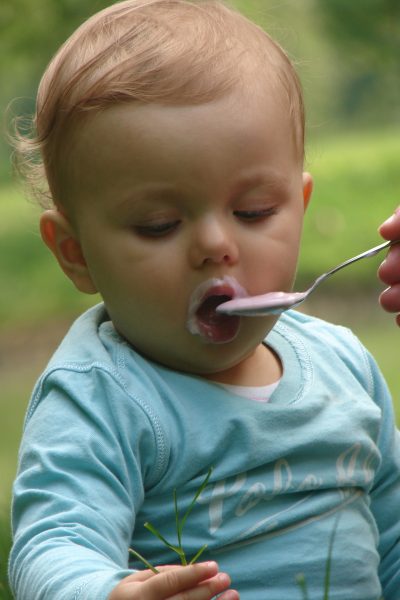by Kenneth Nehrbass
Whenever the term “spoon-feeding” shows up in popular media, it is either used to insult students or to critique the educational system at large. Those who are involved in educational policy and course delivery should have more measurable terms to describe the tension between student support and independent learning.
Why the accusations of spoon-feeding?
The Toronto Star ran a story suggesting that professors who are interested in “actually teaching their students” should provide lecture notes. This seems reasonable to many; however, in response, one letter to the editor, entitled “Don’t spoon-feed students” complained, “Heres [sic] a novel idea: expect students to take their own notes” (Okihiro, 2010). Similarly, a professor’s letter to the editor of the Times (UK) showed concern that lecturers “spoon-feed their students” in order to get better course evaluations (Nicoll, 2016). There seems to be popular-level critique that our educational system is coddling students.
Concerns about spoon-feeding are not limited to Western educational systems. A blog on Kurdish education characterized students as lazy when it comes to studying; and (with a degree of paternalism) likened them to young birds who “expect to be spoon fed.” And at a presentation on Media in East Asia, Lee and Mok (2003) described the colonial pedagogy of Hong Kong as “spoon-feeding” due to a heavy use of rote memory, rather than critical thinking.
While the concern for creating active learners is genuine, these accusations are often unaccompanied by methods for measuring self-direction and critical thinking. Where are the empirical studies that correlate “spoon-feeding” with a lack of initiative?
Spoon-feeding in the literature
Actually, “spoon-feeding” shows up rarely in scholarly literature. In four cases where the term is used in academic journals, it is only in the abstracts, and is never defined. For example, Marks’ (2020) abstract for a study on research librarians says that students are best-helped with scaffolding, rather than spoon-feeding. Mufanti & Susilo’s (2017) research on the direction of graduate theses explains in the abstract that too much feedback on writing can be characterized as spoon-feeding (p. 101). An empirical study on the use of handouts in medical school explains (in the abstract), “Providing handouts does not spoon-feed students with information. Rather, handouts help offer qualitative improvements to lectures” (Wongkietkachorn, Prakoonsuksapan & Wangsaturaka, 2014, p. 789). And lastly, the abstract of Kotsonis’ (2020) conceptual piece contrasts the Socratic method with “spoon-feeding” (p. 251).
Spoon-feeding seems to be more of a popular term, rather than a well-defined academic concept. But educationists are aware of the concern that educators should engage students in active, rather than passive learning. The concern stems from a long-observed phenomenon in education that just giving students the answers (e.g., in a lecture) seems to result in less retention in comparison to more active learning activities (Prince, 2004).
Is one person’s spoon-feeding another professor’s “scaffolding”?
Do any of the following count as “spoon-feeding?”
- Giving clear directions in a syllabus
- Reminding students of deadlines
- Providing notes on lectures
- Reviewing questions on an upcoming exam
Professors seem to have different comfort levels with the amount of instruction and clarification they think is helpful to students. Weimer’s blog “Going beyond the spoon-feeding metaphor” points out that professors need to create criteria that distinguishes spoon-feeding (a term that she reifies, but also critiques) from well-designed courses.
Kotsonis, A. (2020). What can we learn from Plato about intellectual character education? Educational Philosophy & Theory, 52(3), 251–260. https://doi.org/10.1080/00131857.2019.1631157
Lee, A., & Mok, E. (2003). Cultivating Critical Young Minds in Post-colonial Hong Kong: Case Studies of Media Education. Conference Papers — International Communication Association, 1–33. https://doi.org/ica_proceeding_11433.PDF
Marks, N. (2020). Student Engagement in Improving Access to Taught Course Content at LSE Library: Practicalities and Pitfalls. New Review of Academic Librarianship, 26(2–4), 403–418.
Mufanti, R. & Susilo, A. (2017). Bridging the Gaps Between Students’ Prior Knowledge and Skills in Writing and the Expected Thesis Outcomes. JEES (Journal of English Educators Society), 2(2), 101–118. https://doi.org/10.21070/jees.v2i2.982
Nicoll, A. (2016). Raising teaching standards at universities. (May 19). Times, The (United Kingdom), 30.
Okihiro, P. (2010). “Don’t spoon-feed students” Toronto Star (Canada). (March 28).
Prince, M. (2004). Does active learning work? A review of the research. Journal of engineering Education. 93 223-232.
Wongkietkachorn, A., Prakoonsuksapan, J., & Wangsaturaka, D. (2014). What happens when teachers do not give students handouts? Medical Teacher, 36(9), 789–793. https://doi.org/10.3109/0142159X.2014.909921
How would you define spoon-feeding? Or do you despise the term? Is it any different than other pejorative terms like “hand-holding” or “coddling?”
